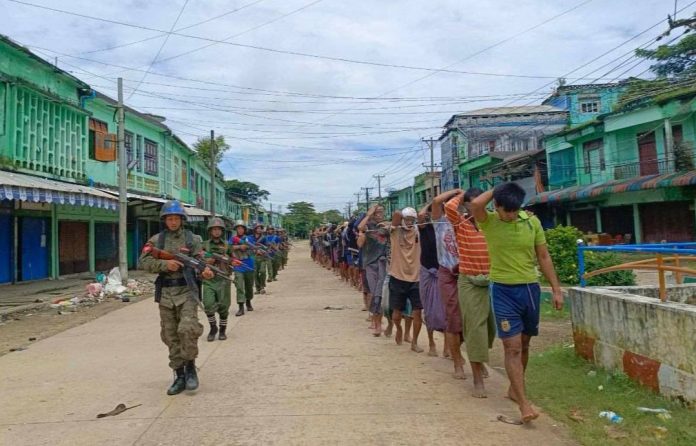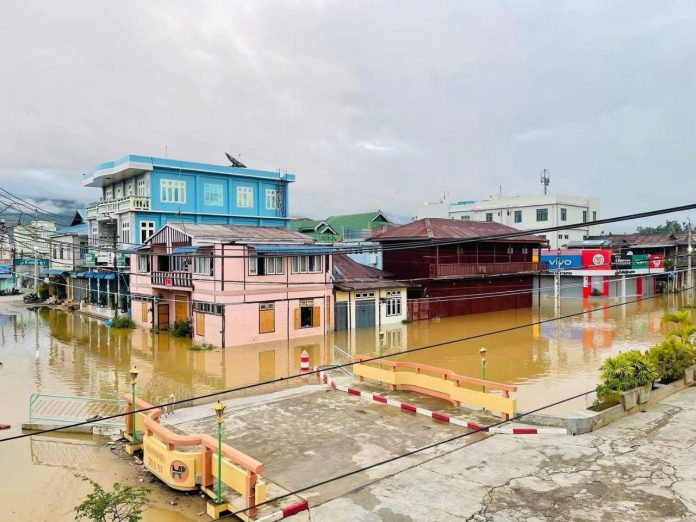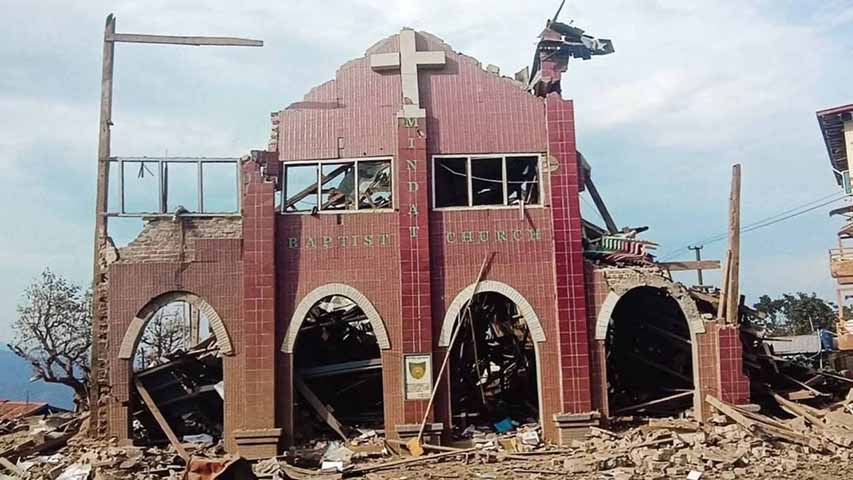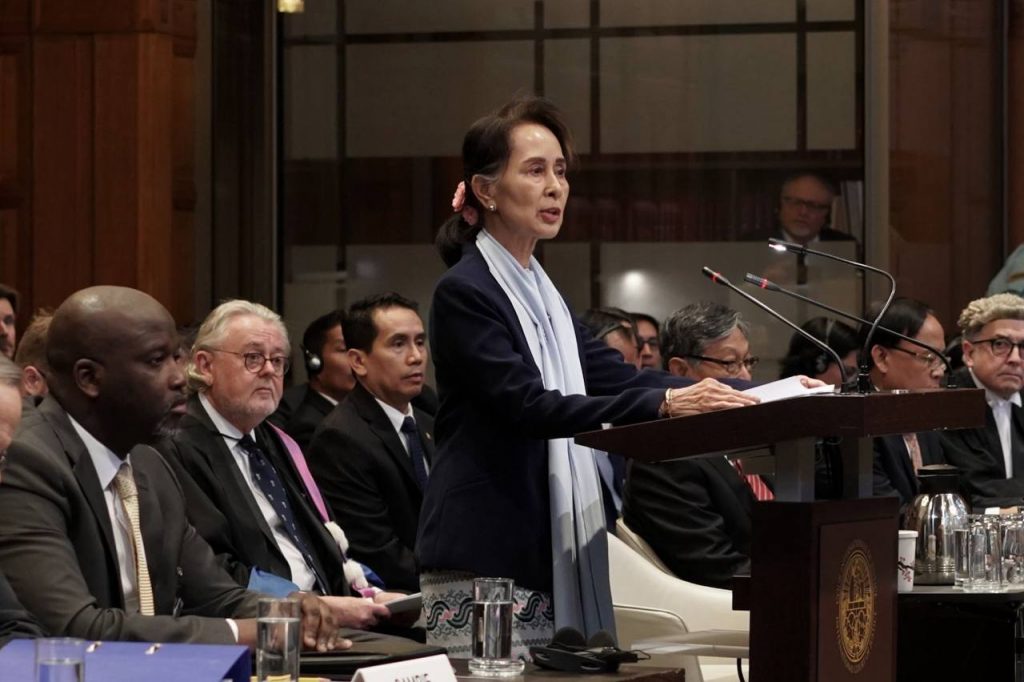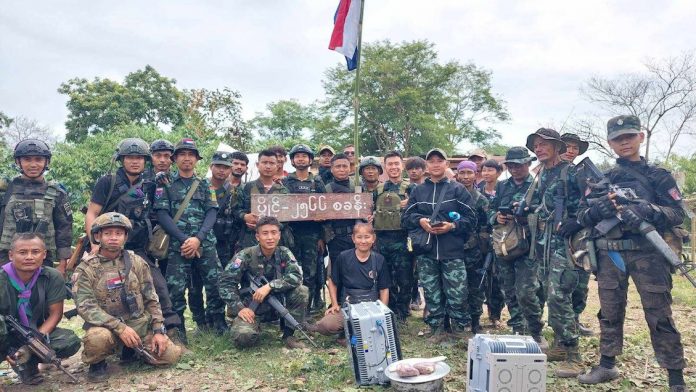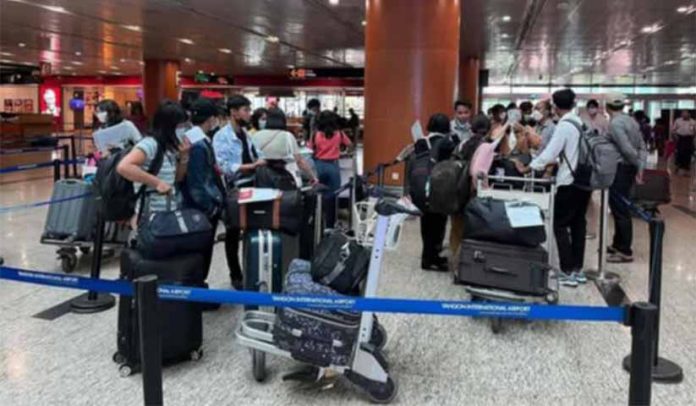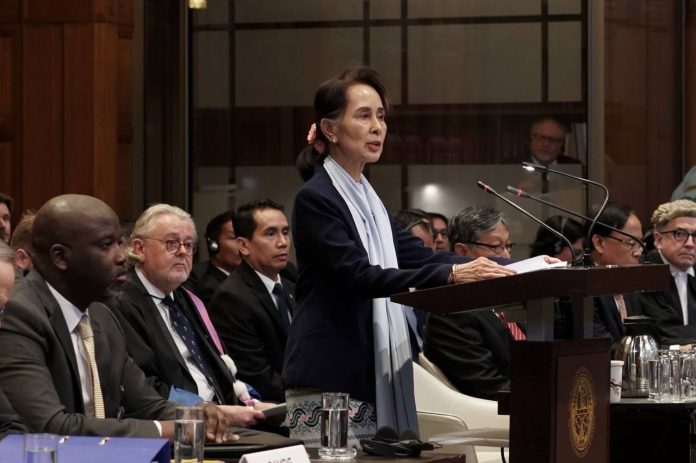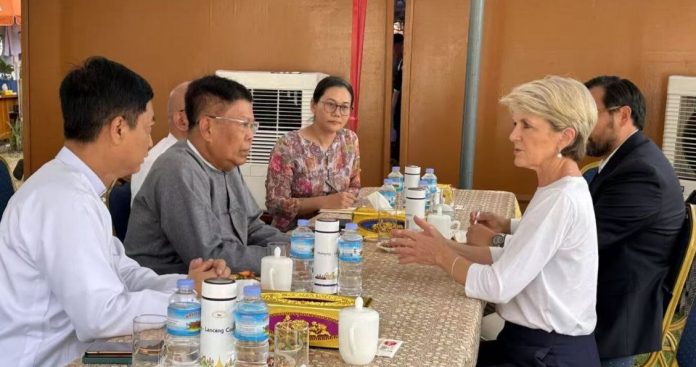Guest contributor
Shafiur Rahman
I never imagined I’d see the day that DVB gave space to historical revisionism, yet so far this year it has published three op-eds by Fergus Harlow – each one defending Aung San Suu Kyi against well-founded allegations of complicity in the Rohingya genocide.
I’m not speaking from a distance: I filmed and interviewed Rohingya men, women and children as they staggered across the Bangladesh border during those horrific weeks of August and September 2017, and I am still in daily contact with refugees who survived slaughter, rape, imprisonment and torture.
That experience makes Harlow’s spin feel like a slap in the face. I write in the first person because my disagreement with his narrative is personal and profound.
His claim that Suu Kyi was powerless under the 2008 constitution, “not complicit” in atrocities, and merely a victim of unfair blame is wrong and dangerous. Such distortion has to be called out in uncompromising terms.
Rewriting history to exonerate Suu Kyi
Harlow’s central argument is that Aung San Suu Kyi had no real power over the military under its 2008 Constitution. Therefore, she cannot be held accountable for what the army did to the Rohingya.
He insists that critics “failed to mention a crucial fact: Suu Kyi had no control over the military.” It’s true that the junta-drafted constitution entrenched significant military autonomy. But to leap from that fact to the claim that Suu Kyi was entirely helpless or faultless is revisionism.
Yes, she lacked direct command of the army – but she was the de facto head of government, the face of Myanmar to the world, and she made conscious choices that provided political cover for the military’s crimes.
Look at what Suu Kyi’s National League for Democracy (NLD) government actually did when the Rohingya crisis unfolded. Instead of speaking up for the victims or at least allowing scrutiny, her administration blocked it at every turn.
In 2017, when the U.N. Human Rights Council established a Fact-Finding Mission to investigate reports of massacres and mass rapes, Suu Kyi’s government flat-out refused to cooperate.
They denied visas to U.N. investigators, with Suu Kyi herself claiming an inquiry “would have created greater hostility between the different communities.”
In other words, she used her authority to keep international eyes out, effectively shielding the army as it carried out what numerous observers would soon label genocidal crimes and other crimes against humanity.
These are not the actions of a powerless bystander. No, they are the actions of a leader making a deliberate decision to obstruct justice and accountability.
When The Gambia brought a genocide case against Myanmar at the International Court of Justice (ICJ) in 2019, Suu Kyi personally traveled to The Hague to defend the military’s onslaught against the Rohingya.
She called it an extremist insurgency, insisting Myanmar had been “tackling an extremist threat” in Rakhine State. Standing before the world, she dismissed the genocide allegations as “incomplete and incorrect.”
She portrayed the 2017 events as nothing more than an “internal armed conflict” triggered by an extremist insurgency, insisting Myanmar had been “tackling an extremist threat” in Rakhine.
Yes, astonishingly, she stuck to the military’s script that they were conducting legitimate “clearance operations” against militants, not targeting unarmed civilians.
Don’t be fooled by Harlow’s refrain that she was “defending Myanmar, not the army.” At the ICJ, “Myanmar” was the army: Suu Kyi repeated the Tatmadaw’s casualty figures, called its scorched-earth campaign “clearance operations,” and asked judges to reject every safeguard for Rohingya civilians.
She cited one token court-martial while blocking U.N. investigators from hundreds of massacre sites in Rakhine. International law treats a state and its agents as one; her brief shielded the generals, full stop.
Suu Kyi did concede that excessive force might have been used and blandly promised, “If soldiers have committed war crimes, they will be prosecuted.”
In practice that translated into one token case. Seven junior soldiers got 10-year sentences for the Inn Din massacre. They were quietly freed after serving barely nine months.
Beyond that symbolic gesture, her government took no meaningful action to punish those responsible. What her ICJ performance really offered was a full-throated defence of the army’s conduct, dressed up in legalese.
She provided diplomatic cover for genocide, urging the judges (and the world) to stand aside while the military “handled” its own business. Calling that “an act of survival,” as Harlow does, is absurd; it was complicity, plain and simple. Suu Kyi chose the perpetrators over the victims.
All this flies in the face of Harlow’s repeated claim that Suu Kyi had “no control” and thus no responsibility. She had the power to shine a light on the atrocities – instead she helped cover them up.
She had the power to say no to defending the indefensible – instead she became its chief apologist. The 2008 Constitution didn’t force Aung San Suu Kyi to dismiss U.N. reports and block investigators; that was her decision.
Harlow’s narrative erases these inconvenient facts in an effort to whitewash Suu Kyi’s legacy.
Distorting the Rohingya crisis and ARSA’s role
Perhaps the most pernicious part of Harlow’s writing is his fixation on the Arakan Rohingya Salvation Army (ARSA). ARSA’s 25 August 2017 attacks on police posts were real; they killed a dozen officers. But Harlow seized on those raids to blame the entire Rohingya community for its own destruction.
He labels ARSA an “Islamic terrorist group,” even though multiple investigations – from the International Crisis Group to Amnesty International – have found no evidence of global-jihadi links.
He claims that ARSA staged a “deliberate provocation” to trigger the military’s response, then drags in an Israel-Hamas analogy, arguing that downplaying ARSA is like ignoring 7 October. This is an inflammatory comparison that conflates a small, locally armed faction with an entire civilian population.
What Harlow never mentions is that ARSA was already a compromised force. It was riddled with informants, monitored by Myanmar intelligence, and manipulated as a convenient pretext.
Multiple researchers, organisations and local sources have shown how the military and security agencies watched ARSA form, infiltrated it, and then seized on its attacks to launch a pre-planned “clearance” campaign. ARSA’s limited raids do not in any way justify what followed.
And what followed was genocide. In the days and weeks after those raids, the military razed villages, systematically raped women, butchered children, and drove more than 700 000 Rohingya into Bangladesh.
Médecins Sans Frontières (MSF) later estimated at least 6,700 Rohingya (730 of them children under age five), were killed in the first month alone.
The U.N. Fact-Finding Mission concluded that the army’s tactics were “grossly disproportionate to any security threat” and bore every hallmark of genocidal intent. A few hundred poorly armed guerrillas do not excuse the mass extermination and expulsion of an entire ethnic group.
By parroting the military’s ARSA talking-points, Harlow smears the victims as terrorists and recycles the same propaganda Myanmar’s generals peddled to the world.
The Rohingya fled bullets, blades and fire from the Myanmar army. U.N. investigators called Myanmar’s excuses “shocking for the level of denial, normalcy and impunity.”
Nothing is more cynical than turning ARSA’s raids into a get-out-of-jail-free card for genocide, yet that is exactly what Harlow tries to do.
Selective quotes and anecdotes
Another hallmark of Harlow’s defense of Suu Kyi is his selective use of evidence. He cherry-picks quotes and anecdotes that support his narrative, while ignoring mountains of evidence that contradict it.
For instance, Harlow eagerly highlights Suu Kyi’s bland assurances at the ICJ that Myanmar would “have no tolerance for human rights abuses” and would prosecute wrongdoing, He paints these as sincere, significant statements rather than the empty rhetoric they were.
Harlow repeatedly cites anecdotes from his interviews – especially conversations with Suu Kyi’s son Kim Aris – as if these personal recollections conclusively debunk the entire international consensus on what happened.
Aris, in Harlow’s interviews, claims his mother “wasn’t complicit in ethnic cleansing” and that the media scapegoated her by making people believe she controlled the military.
I don’t blame a son for defending his mother but Harlow takes these partisan recollections at face value, elevating them above the hard facts gathered by the U.N., human rights organizations, and countless journalists.
Meanwhile, Harlow misrepresents and maligns credible sources that challenge his revisionism. In one of his op-eds, he targets journalist Mehdi Hasan for a 2015 Al Jazeera English segment highlighting the plight of the Rohingya.
Hasan had pointed out that it wasn’t Buddhists who were confined to fetid internment camps and that a U.N. Special Rapporteur warned the treatment of Rohingya could amount to crimes against humanity.
These are truths attested by the U.N. and observers. Yet Harlow dismisses Hasan’s factual report as “divisive polemics… the lazy default of an increasingly myopic media landscape.”
Think about that: reporting the suffering of a persecuted minority and the U.N.’s warnings is “divisive” in Harlow’s view.
It seems the only “unity” he respects is the unity of silence and denial. Harlow scours the record for any errors. For example, he quibbles over a BBC timeline mistake about arrests during earlier riots to claim a grand media conspiracy against Suu Kyi, yet he utterly ignores the crucial findings of the U.N. Fact-Finding Mission.
That mission, based on hundreds of witness interviews, not only documented the military’s crimes in horrific detail but also criticized Suu Kyi personally for failing to use her position or moral authority to try to stop the violence.
The U.N. concluded that Suu Kyi’s civilian authorities “contributed to the commission of atrocity crimes” by permitting hate speech, excusing the army’s actions and obstructing investigations.
Harlow never mentions this. He would rather quote a sympathetic monk or a contrarian former diplomat to bolster his case than contend with volumes of evidence from credible international bodies. This is intellectual dishonesty of the highest order.
The irony is that Harlow presents himself as a “human rights advocate,” yet in his zeal to defend Suu Kyi, he tramples on the very concept of accountability for gross human rights violations.
He effectively argues that the world owes Suu Kyi an apology: “her critics… owe her more than criticism; they owe her an apology,” he and his co-author wrote, while the Rohingya people, who endured mass murder and expulsion, apparently are owed nothing but silence in his narrative.
Well, I am sorry, but no. It is Suu Kyi who owes an apology to the Rohingya, and Fergus Harlow who owes an apology to the truth.
The “inter-communal conflict” myth
Harlow keeps insisting the Rohingya crisis was just another round of “sectarian clashes” between Buddhists and Muslims. That is simply false. The 2012 and 2013 attacks in Rakhine were not spontaneous riots; historians, Human Rights Watch, and the U.N. all document how security forces armed Rakhine mobs, withdrew police so violence could spread, and then torched Rohingya villages in coordinated waves.
By 2017 the same playbook scaled up into a full military operation: mass rape, village burnings, and systematic slaughter. These are the hallmarks of state-organised genocide, not a neighbourhood brawl gone wrong!
Calling that “communal violence” whitewashes the Myanmar military’s central role, erases state planning, and shifts blame onto the very community that was massacred.
Harlow’s agenda in light of Gaza and Israel
One cannot help but wonder what drives Harlow’s fierce attempts to rehabilitate Suu Kyi’s image at the expense of historical truth. A clue can be found in Harlow’s own social media presence. His profile picture on Facebook features Aung San Suu Kyi’s face against the background of an Israeli flag, which is an image credited to Jack Guez of Getty Images.
In the context of the current Gaza conflict – where Israeli forces have been bombarding Palestinians – this imagery is alarming and telling. It suggests that Harlow’s motivations are not simply about Myanmar; they are ideological and global.
By visually linking Suu Kyi to Israel’s flag, Harlow hints at a worldview in which he consistently sides with state power accused of atrocities, so long as that state claims to be fighting “terrorists.”
The Rohingya crisis and the Gaza war may be very different in many respects, but in Harlow’s mind they seem to rhyme. In both cases Harlow sees a beleaguered government such as Suu Kyi’s Myanmar or the state of Israel, under attack by “Islamic terrorists” such as ARSA or Hamas, and unfairly maligned by the world’s media and human rights bodies.
And in both cases, he pointedly overlooks or rationalises the mass suffering of a Muslim civilian population, be it the Rohingya or the Palestinians, because acknowledging that suffering would undermine the narrative of the state as the true victim.
This parallel is as disturbing as it is offensive. It reveals a deeper motivation behind Harlow’s writing – one that has nothing to do with genuine human rights advocacy.
Against revisionist myths
Fergus Harlow’s toolkit is painfully familiar: recast genocide as mere “civil unrest,” shift blame onto the victims and anyone who defends them, elevate Aung San Suu Kyi to tragic-hero status, and wave the flag of nationalism to drown out hard evidence.
He shrugs off U.N. findings, scoffs at Argentine arrest warrants, and calls any outside scrutiny “Western bias” while insisting, without a shred of proof, that international criticism somehow caused the 2021 Myanmar military coup.
He is laying the groundwork for a posthumous blame campaign. When Aung San Suu Kyi eventually passes away, especially given her age and conditions of imprisonment, people like him will be ready to say: “Look what you did. You hounded an innocent woman and doomed Myanmar’s last hope.”
By constantly framing Suu Kyi as a victim, and international justice efforts as malicious “narrative warfare,” he’s preparing an emotional backlash against the Rohingya and against anyone who ever demanded accountability.
It’s a highly cynical, pre-emptive narrative trap. It aims to discredit the genocide claims, delegitimise Rohingya activism, and rewrite history – turning the actual victims into the “villains” once again.
In conclusion, I speak out in the first person because I refuse to be complicit through silence. Fergus Harlow is free to pen his opinions, but the rest of us are free to call them out as the dangerous, revisionist drivel that they are.
The victims of atrocities deserve better than to have their reality denied and their oppressors absolved in respected media outlets. DVB should stand for democratic values, not as a platform whitewashing crimes against humanity.
The voices that truly need amplification are those of the genocide survivors and the brave investigators uncovering the truth – not the voice of an apologist trying to rewrite history in favour of the powerful.
Shafiur Rahman is a journalist and documentary filmmaker focusing on the politics of refugee management in South and Southeast Asia. He writes the Rohingya Refugee News newsletter.
DVB publishes a diversity of opinions that does not reflect DVB editorial policy. We’d like to hear what you think about this or any of our stories: [email protected]


